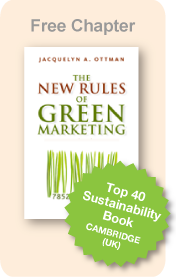Jacquie Ottman's
Green Marketing Blog
A Country Divided on Climate Change: What Green Marketers Can Learn
October 13, 2008 by assistant
According to the 2008 American Climate Values Survey (ACVS), the American public is deeply divided on the issue of climate change. These deep rifts trace to such factors as religion, political affiliation, and even the perceived state of the economy. Understanding such dynamics creates an opportunity for green marketers to step in with relevant and targeted messages.
Although public recognition of global warming has increased greatly over the past several years, climate change still remains relatively low on the list of priorities for all but the most ardent advocates. The economy, hit hard by the recent rise in oil prices and the financial crisis on Wall Street, takes precedence over the environment for many Americans. For instance, according to the ACVS, 42% of U.S. adults feel that “since the economy is in bad shape, we need to hold off on programs to stop global warming.” Indeed, according to the latest nationwide survey by the Pew Research Center for the People & the Press, between February and June of 2008, public support for “expanding mining, drilling, and the construction of new power plants” increased from 35% to 47%. (Source: Pew Research Center for the People & the Press, “Gas Prices Pump Up Support for Drilling”, July 1, 2008, [http://pewresearch.org/pubs/884/gas-prices], accessed on October 8, 2008)
Political and religious affiliations also generate strong rifts on the topic of climate change. 43% of American adults feel that “God will take care of global warming in God’s own way,” suggesting that these individuals are less inclined to consider environmental issues in their purchasing habits. Additionally, 90% of Democrats as compared to 54% of Republicans believe that “global warming is happening,” making political affiliation the single strongest indicator of feelings on climate change. In both cases, “deniers” of climate change can undermine the concern of other groups by generating a sense of confusion or doubt that makes even believers less likely to take action.
Green Marketing Opportunities
To make climate change more relevant and drive consumers to action, position climate change as a threat to more pressing issues such as national security, public health, and most importantly, the economy. Global warming is an abstract, complex, and long-term concept, while a struggling economy provides more tangible and immediate threats to consumers. Marketers can learn from the success of the organic foods industry which has been driven less by concern about environmentally sustainable farming than the appeals of better tasting food and health. GE understands this concept. The primary message of their Ecomagination green marketing campaign is not saving the environment, but leveraging forward thinking technologies to boost sales and profits.
Demonstrate that consumer environmental responsibility is consistent with the themes of religion. Instead of attempting to convince people that global warming is man-made, green marketers can reach out to religious leaders to stress the importance of respecting the natural world as part of God’s creation.
Finally, bridge the gap between Democrats and Republicans by drawing on a sense of patriotism and respect for country. The ACVS found that 81% of adults think “Americans should always try to buy American products.” In fact, one of the most successful anti-litter campaigns in the United States—“Don’t Mess With Texas”—preaches remarkably little about the environmental impacts of littering in its ads. Instead, by drawing heavily on Texas state pride, the campaign has successfully reduced roadside littering by one third since 2001. (Source: Texas Department of Transportation, “Don’t Mess with Texas”, [http://www.dontmesswithtexas.org/home.php], accessed on October 8, 2008)
Click here to join our mailing list.



 ShareThis
ShareThis

